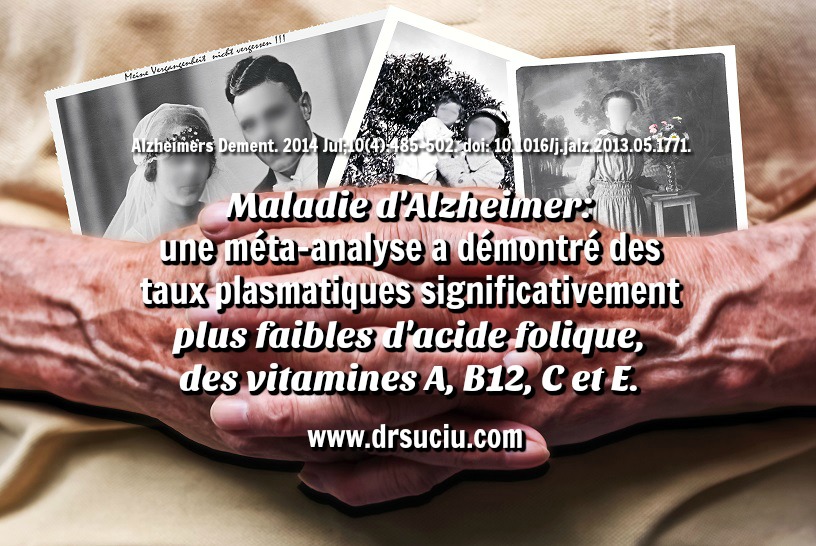|
Chez les patients atteints de la maladie d'Alzheimer, une méta-analyse a démontré des taux plasmatiques significativement plus faibles d'acide folique, des vitamines A, B12, C et E. Des niveaux plus faibles de nutriments plasmatiques indiquent que les patients atteints de la maladie d'Alzheimer ont une déficience systémique dans la disponibilité de plusieurs nutriments. La malnutrition classique est bien connue pour être courante dans la maladie d'Alzheimer, ce qui suggère que l’état compromis de micronutriments pourrait précéder la malnutrition en protéine et le manque d’énergie. Veuillez lire l'article complet (en anglais seulement) :
Abstract BACKGROUND: Alzheimer disease (AD) patients are at risk of nutritional insufficiencies because of physiological and psychological factors. Nutritional compounds are postulated to play a role in the pathophysiological processes that are affected in AD. We here provide the first systematic review and meta-analysis that compares plasma levels of micronutrients and fatty acids in AD patients to those in cognitively intact elderly controls. A secondary objective was to explore the presence of different plasma nutrient levels between AD and control populations that did not differ in measures of protein/energy nourishment. METHODS: We screened literature published after 1990 in the Cochrane Central Register of Controlled Trials, Medline, and Embase electronic databases using Preferred Reporting Items for Systematic reviews and Meta-Analyses (PRISMA) guidelines for AD patients, controls, micronutrient, vitamins, and fatty acids, resulting in 3397 publications, of which 80 met all inclusion criteria. Status of protein/energy malnutrition was assessed by body mass index, mini nutritional assessment score, or plasma albumin. Meta-analysis, with correction for differences in mean age between AD patients and controls, was performed when more than five publications were retrieved for a specific nutrient. RESULTS: We identified five or more studies for folate, vitamin A, vitamin B12, vitamin C, vitamin D, vitamin E, copper, iron, and zinc but fewer than five studies for vitamins B1 and B6, long-chain omega-3 fatty acids, calcium, magnesium, manganese, and selenium (the results of the individual publications are discussed). Meta-analysis showed significantly lower plasma levels of folate and vitamin A, vitamin B12, vitamin C, and vitamin E (P < .001), whereas nonsignificantly lower levels of zinc (P = .050) and vitamin D (P = .075) were found in AD patients. No significant differences were observed for plasma levels of copper and iron. A meta-analysis that was limited to studies reporting no differences in protein/energy malnourishment between AD and control populations yielded similar significantly lower plasma levels of folate and vitamin B12, vitamin C, and vitamin E in AD. CONCLUSIONS: The lower plasma nutrient levels indicate that patients with AD have impaired systemic availability of several nutrients. This difference appears to be unrelated to the classic malnourishment that is well known to be common in AD, suggesting that compromised micronutrient status may precede protein and energy malnutrition. Contributing factors might be AD-related alterations in feeding behavior and intake, nutrient absorption, alterations in metabolism, and increased utilization of nutrients for AD pathology-related processes. Given the potential role of nutrients in the pathophysiological processes of AD, the utility of nutrition may currently be underappreciated and offer potential in AD management. RÉFÉRENCE: http://www.ncbi.nlm.nih.gov/pubmed/24144963 Alzheimers Dement. 2014 Jul;10(4):485-502. doi: 10.1016/j.jalz.2013.05.1771. Epub 2013 Oct 19. Plasma nutrient status of patients with Alzheimer's disease: Systematic review and meta-analysis. Lopes da Silva S1, Vellas B2, Elemans S3, Luchsinger J4, Kamphuis P1, Yaffe K5, Sijben J6, Groenendijk M3, Stijnen T7. Les commentaires sont fermés.
|
AVIS IMPORTANT:
Veuillez prendre connaissance de cet avertissement et rappelez-vous que le site www.drsuciu.com ne saurait remplacer une consultation avec vos professionnels de la santé. L'information fournie sur le site web www.drsuciu.com est d'ordre général. Avant de prendre toute décision de nature médicale ou si vous avez des questions concernant votre état de santé personnel, adressez-vous à un professionnel de la santé qualifiée. D'aucune manière ces points de vue, commentaires et renseignements ne constituent une recommandation de traitement (préventif ou curatif), une ordonnance ou un diagnostic, ni ne doivent être considérés comme tels. Archives
Août 2017
|



 Flux RSS
Flux RSS